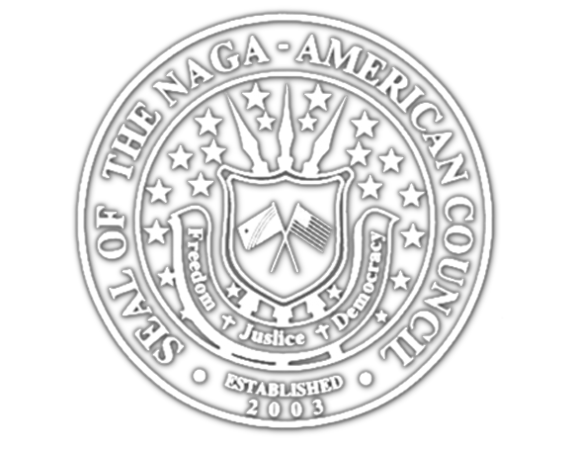Mission Statement
About Us
Mission Statement

The Naga - American Council was founded in 2003 as a non-partisan organization whose mission is to address the Naga people's right to self-determination from India. The Naga - American Council is a voice for the Naga people in America. It seeks to raise awareness of the challenges affecting the Nagas by working with U.S. public officials, the media, and grassroots organizations. It is dedicated to promoting democracy and preventing conflict through the use of cultural exchange, practical solutions, education and the transparent petitioning of the U.S. Government. Its hope is that through enduring dialog and peaceful negotiation, the Naga people will finally live in freedom, peace, and prosperity alongside their neighbors.
Goals
Assist in Repealing oppressive laws used on the Naga People by the Government of India.
1. Repeal Armed Forces Special Powers Act of 1958
The Armed Forces Special Powers Act of 1958 (AFSPA) is an act of the Parliament of India that grants special powers to the Indian Armed Forces in what it terms “disturbed areas” in the states of Arunachal Pradesh, Assam, Manipur, Meghalaya, Mizoram, Nagaland and Tripura. The act has been in force in these seven states since 1958, and has been extended to the state of Jammu and Kashmir since 1990. The act grants the Indian Armed Forces the power to search any premises without a warrant, to arrest any person without a warrant, and to shoot to kill any person acting in contravention of the law. The act also grants immunity from prosecution to the Indian Armed Forces personnel for actions taken under the Act.
AFSPApetition Download
2. Foreign Contribution (Regulation) Act, 2010 (FCRA)
The Foreign Contribution (Regulation) Act, 2010 (FCRA) is an Indian law that regulates the acceptance and utilization of foreign contribution or foreign hospitality by certain individuals or associations. It is administered by the Ministry of Home Affairs. The Act seeks to ensure that foreign contributions are not utilized for activities detrimental to the national interest, and that the activities of persons or associations receiving foreign contributions are not adversely affected by such contributions.
3. Violence against Christians in India
Anti-Christian violence in India is religiously motivated violence against Christians in India. Human Rights Watch has classified violence against Christians in India as a tactic used by the right-wing Sangh Parivar organizations to encourage and exploit communal violence in furtherance of their political ends. The acts of violence include arson of churches, conversion of Christians by force, physical violence, sexual assaults, murders, rapes, and the destruction of Christian schools, colleges, and cemeteries.
Anti-Christian violence increased dramatically since the Bharatiya Janata Party (BJP) started its rule at the center in March 1998. The Vishva Hindu Parishad (VHP), Bajrang Dal, and Rashtriya Swayamsevak Sangh (RSS) are the organizations which have been most frequently accused of inciting the violence.
Hundreds of incidents of violence against Christians are reported by various organizations every year. India's ministry of internal security and its National Commission for Minorities (NCM) officially list more than a hundred religiously motivated attacks against Christians each year.
As of 2020, the USCIRF placed India as Tier-1 in minority persecution along with countries like China, North Korea, Pakistan and Saudi Arabia.
Christianpersecution Download
Overview of UN's Declaration of Human Rights Violations in Nagalim
The United Nation's (UN) Declaration of Human Rights Violations in Nagalim is a formal statement of the UN’s concern about the human rights abuses of the Naga people in the Nagalim region. The region is a disputed area between India, Myanmar, and the Naga people, a minority ethnic group in northeast India. The Declaration was released in December of 2018, with the purpose of condemning the human rights violations in Nagalim and calling for an end to violence and discrimination against the Naga people. The Declaration focuses on violations of the right to life, including extrajudicial killings, torture, and arbitrary detention; the right to equality, such as discrimination and denial of access to education and healthcare; and the right to self-determination, such as the denial of the right to political participation. The Declaration also calls for the implementation of justice for victims of human rights abuses and for the strengthening of the rule of law in Nagalim. The Declaration is an important step in recognizing the human rights issues in Nagalim and the need for action to address the violations. The Declaration serves to provide the necessary international attention to the situation, and encourages the governments of India, Myanmar, and the Naga people to take steps to protect the rights of the Naga people and promote peace in the region.


